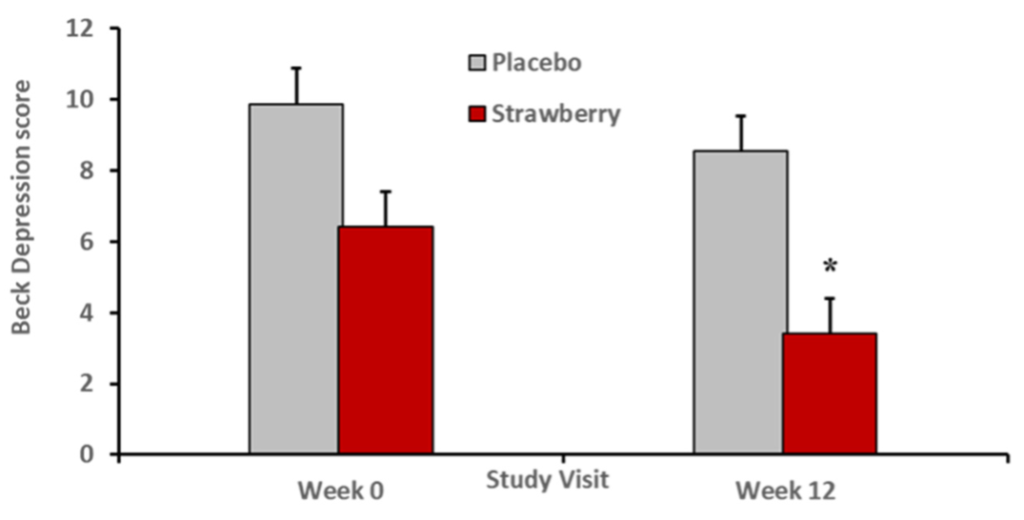Eating Strawberries Boost Memory and Wards Off Depression, Study Shows
Scientists show that strawberry supplementation improves the memory and mood of overweight, middle-aged individuals.
Highlights:
- Supplementing with strawberry powder improves the cognitive performance of overweight, middle-aged individuals.
- Strawberry powder reduces symptoms of depression in overweight, middle-aged individuals.
It is becoming increasingly clear that obesity is a key factor in driving neurodegenerative disorders like Alzheimer’s disease and Parkinson’s disease. This is because obesity leads to chronic inflammation, which gradually damages the brain. Therefore, consuming foods with anti-inflammatory effects could counteract neurodegeneration.
Now, Krikorian and colleagues report in Nutrients that supplementing with strawberries — rich in anti-inflammatory molecules — improves the memory of overweight, middle-aged individuals. Furthermore, they show that strawberry supplementation alleviates depression in these individuals. These findings suggest that a diet rich in foods like strawberries could counteract the brain dysfunction associated with obesity and aging.
Strawberry Powder Improves Memory and Heightens Mood
A total of 30 participants were divided into two equal groups: a strawberry group and a placebo group. Each day, the strawberry group received the equivalent of 1 cup of whole strawberries, which were made into a powder containing 36.8 mg of anthocyanins — a class of compounds that give strawberries their anti-inflammatory effects. On average, the participants weighed about 220 pounds and had a body mass index (BMI) of about 35 (BMI > 30 is considered obese).
After 12 weeks, the strawberry group did better than the placebo group on a memory recall test called the California Verbal Learning Test (CVLT). For this test, participants were read words from a “target” list and an “interference” list, with the goal of only remembering words from the target list. If interference words were recalled instead of target words, this was counted as an intrusion error. Overall, the strawberry group made fewer of these errors, suggesting improved cognitive performance.
More specifically, fewer intrusion errors suggest less memory interference for the strawberry group. Memory interference occurs when some memories interfere with others. For example, the memory of the word “banana” being on the target list (when it was actually on the interference list) could intrude on the memory of the word “orange” being on the target list (when it actually was).

(Krikorian et al., 2023 | Nutrients) Strawberries Enhance Memory. After 12 weeks, the strawberry group made fewer intrusion errors on the California Verbal Learning Test (CVLT) compared to the placebo group, suggesting improved memory.
To assess the effect of strawberry powder supplementation on depression, Krikorian and colleagues had the participants answer 21 questions (Beck Depression Inventory) designed to quantify depression-related symptoms such as hopelessness, irritability, and guilt. The results showed that the strawberry group scored lower on the inventory than the placebo group, suggesting that they were less depressed.

(Krikorian et al., 2023 | Nutrients) Strawberries Improve Mood. After 12 weeks, the strawberry group scored lower on the Beck Depression Inventory, suggesting they had fewer depressive symptoms.
Memory interference is a common cognitive deficit associated with dementia and neurodegeneration. However, Krikorian and colleagues show that strawberry powder supplementation diminished memory interference. Furthermore, strawberry supplementation led to less depressive symptoms. The authors argue that both improvements are because of superior executive function, whereby intrusive thoughts and negative emotions can be suppressed and controlled, respectively.
Moreover, executive function begins to decline in middle-age and is exacerbated by obesity. Therefore, the participants may have started the study with executive function deficits, which strawberry supplementation was able to counteract. Similar results were previously shown with blueberry supplementation, which also contains anthocyanins. The authors conclude,
“Daily supplementation with 13 g whole fruit strawberry powder reduced interference in memory and depressive symptoms in overweight middle-aged individuals. These findings were understood as manifestations of improved executive control. Anti-inflammatory action of anthocyanin-containing strawberry powder was suggested as a primary mechanistic factor.”
Eating Strawberries to Deter Dementia
It is unclear whether younger and healthier individuals will benefit from strawberries. It’s more likely that strawberry supplementation will improve the memory and mood of individuals who are overweight, middle-aged and/or at risk for diabetes and dementia because these individuals are prone to cognitive dysfunction.
Additionally, it should be pointed out that the strawberries in this study were desiccated, freeze-dried, and milled to make a powder, which may digest more efficiently than whole strawberries. Still, it possible that eating 1 cup of whole strawberries every day may have the same effects as strawberry powder, which can be purchased online. Studies comparing the effects of whole strawberries to strawberry powder will elucidate which form is more beneficial.
Participants: Overweight, middle-aged adults at risk for dementia and diabetes
Dosage: 13 grams of strawberry powder, equivalent to 1 cup of whole strawberries

